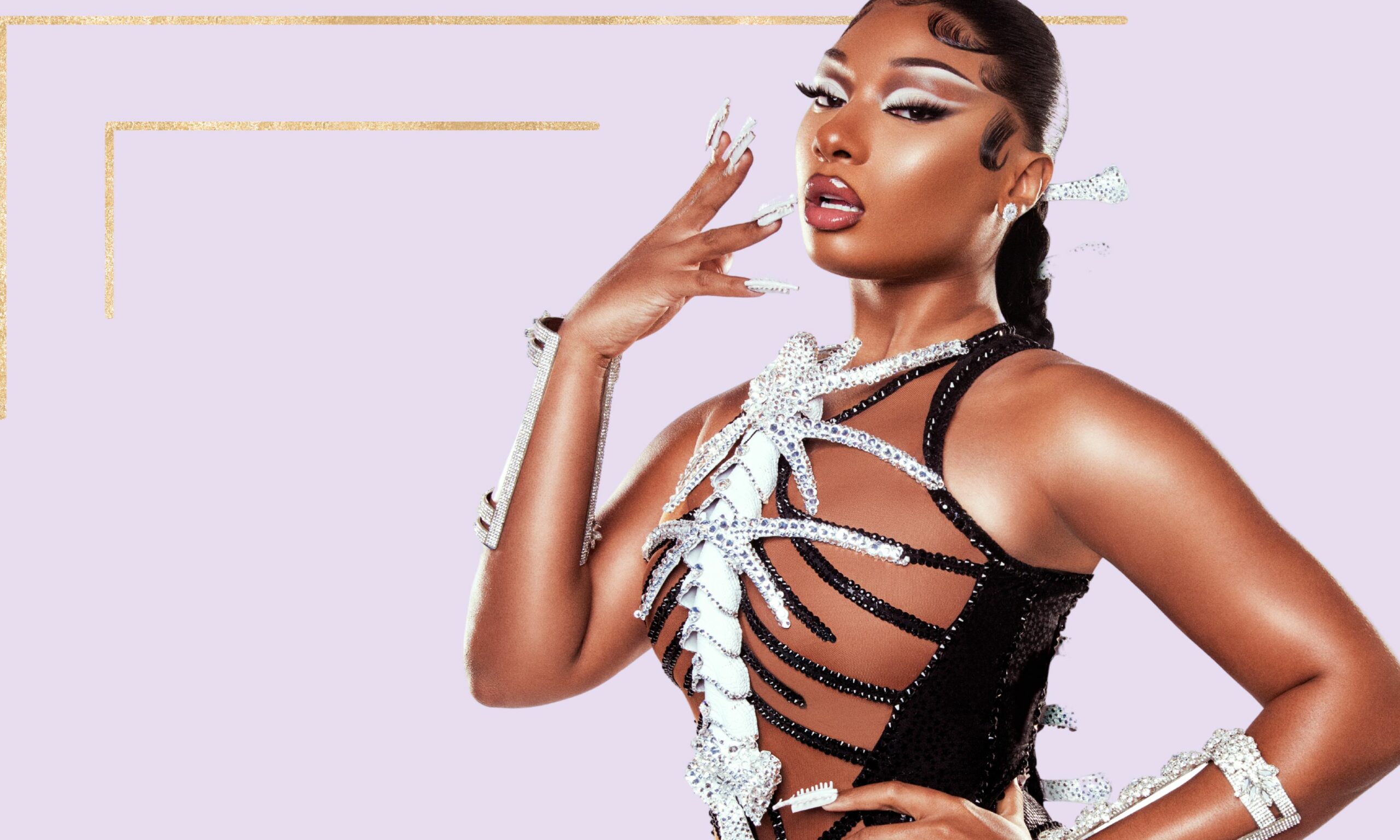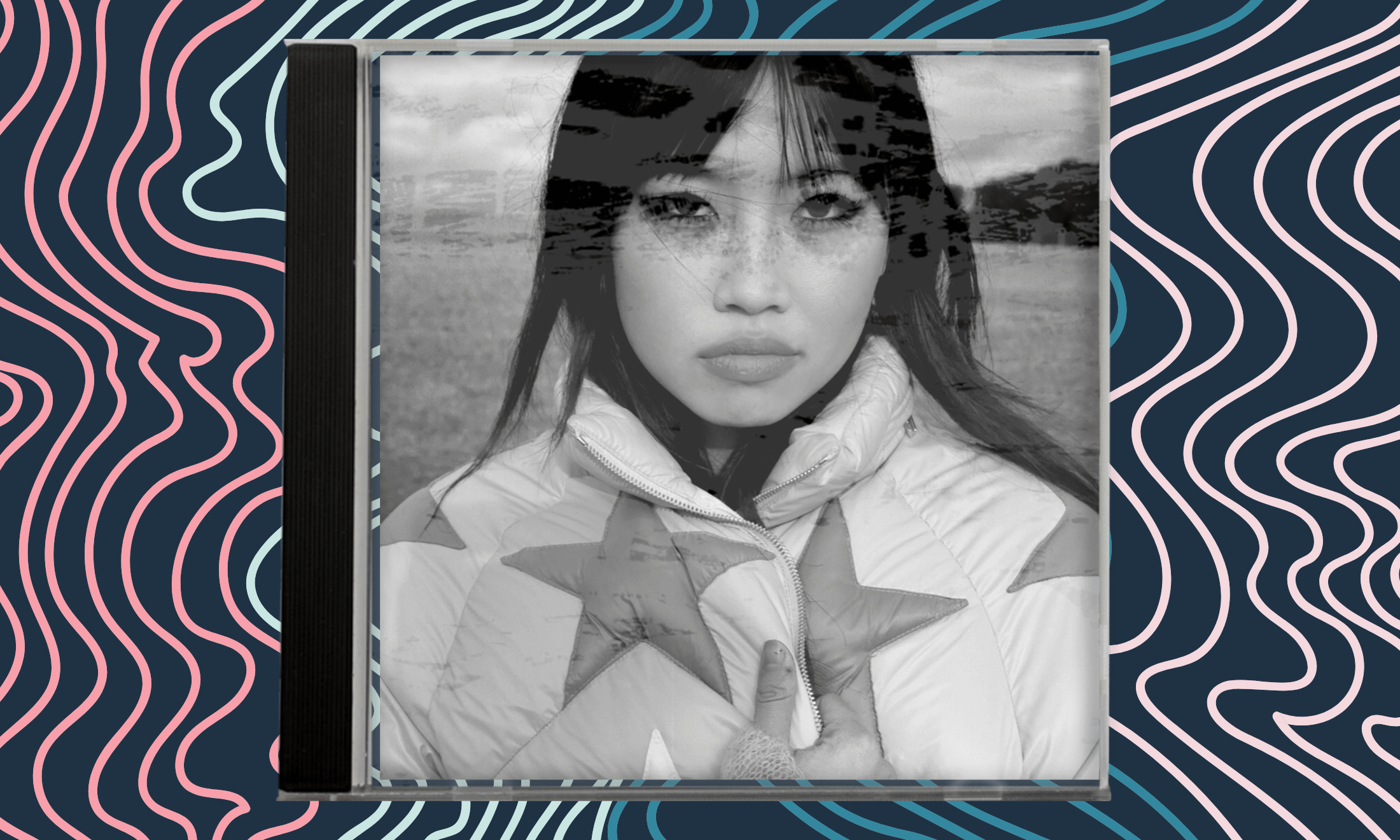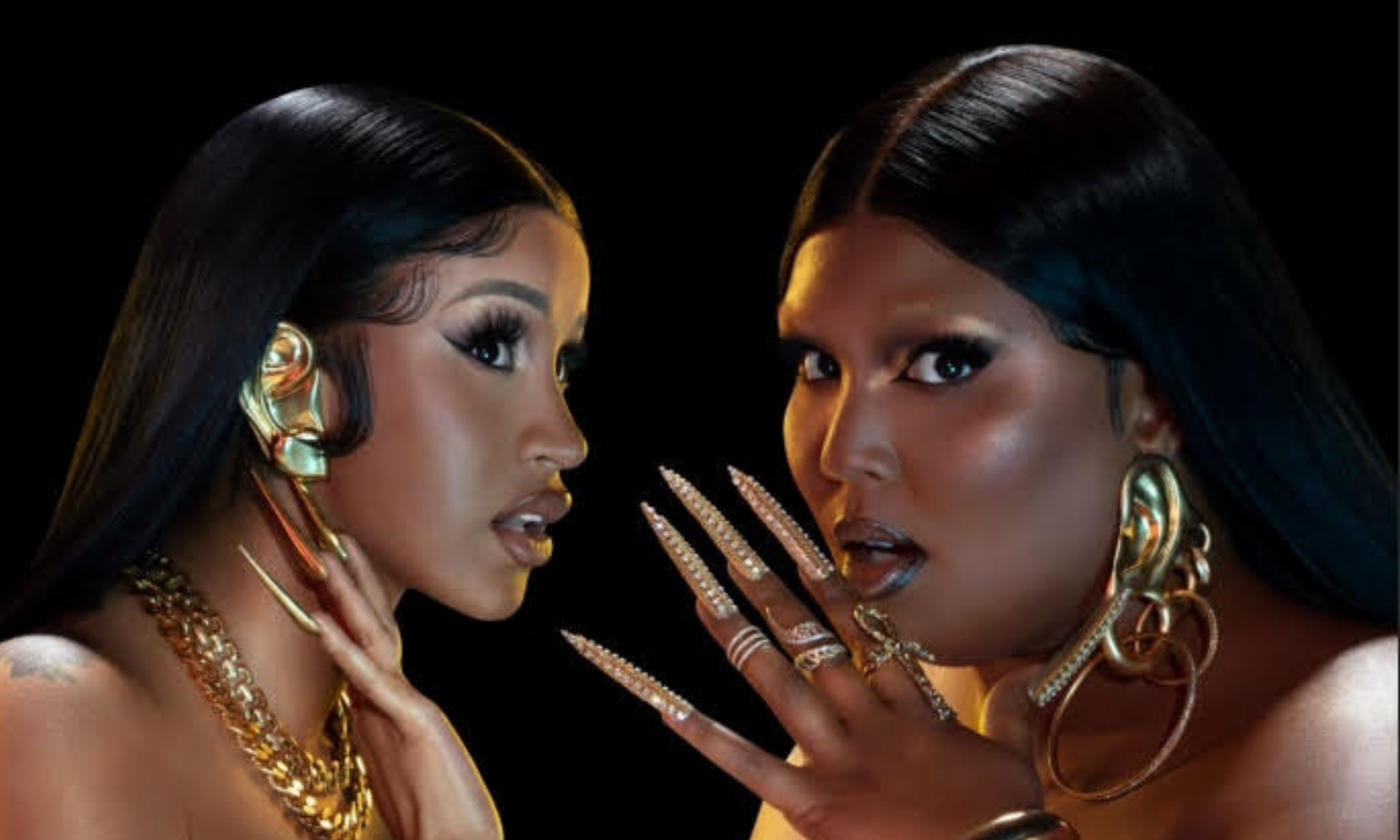
Photography composite via Wikimedia Commons / Instagram @theestallion
‘She must’ve slept with label executives’ and other lies: why women in hip-hop deserve more respect
The era of higher visibility and bank for women hip-hop artists is here, with Megan Thee Stallion, Lizzo and Cardi B dominating the charts in recent years. But from ‘gold digger’ stereotypes to record label feuds, misogyny persists.
Jaelani Turner-Williams
07 Jul 2020
As made clear by the recent HBO documentary On the Record, chronicling hip-hop mogul Russell Simmons and his alleged sexual misconduct, hip-hop in America has denigrated women for decades. The fact that, in 2017, Cardi B was the first woman rapper to top the Billboard Hot 100 with a solo song since Lauryn Hill back in 1998 is telling of a scene that has failed to platform women. Now, even with the growing viral popularity of women rappers and “rap socialites” (women who are admired for their social media relevance and lifestyles), their presence in hip hop isn’t wholly celebrated. In some spaces, they are the victims of outright disrespect.
Black women have always been involved in the hip-hop scene, which emerged in the late 70s in New York. Sylvia Robinson is well-known for her role in conceiving and producing the first successful rap record (‘Rapper’s Delight’ by The Sugarhill Gang), while MC Lyte has been recognised as the first woman rapper to release a full-length album in 1988, aged only 17.
But although there are some notable exceptions, women have long been overlooked for their artistry in the industry and their historical contributions to the scene have been ignored. It’s often through aesthetics that they’ve been able to fuel hip-hop. The influx of women rappers in the 1990s were salacious; with artists such as Lil Kim, Foxy Brown and Trina using sex appeal to reel in listeners alongside their uninhibited lyricism. Before reaching the social media stratosphere, hip-hop influencers in the early-2000s, like Melyssa Ford and Rosa Acosta, became generation-defining video vixens and adult performers – similarly marketing their sexuality.
‘Good girls’ and gold diggers
As the video vixen role pivoted to social media, hip-hop models like India Love and Cuban Doll, alongside many others, have turned regular postings into endorsement deals by partnering with makeup, hair and clothing brands. But social media isn’t always a safe space for women in hip-hop.
Influencers in the hip-hop sphere, like Savage Fenty Ambassador Ari Fletcher, model Taina Williams, Love & Hip-Hop Atlanta star Alexis Skyy and model and influencer Blac Chyna have faced attacks and projection online. One Twitter user referred to Ari as “toxic” in a viral tweet, while Alexis was recently criticised for her appearance on Tory Lanez’s Instagram livestream for twerking. Social media users gawked at the sight of Blac Chyna attending the 92nd Academy Awards in February, baffled at her presence there.
There is regular vilification of hip-hop models and influencers, with biased assumptions that these women are destructive. Rather than esteeming these women as established moguls in their own right, they’re often only valued for their physical appearances and for mothering the children of rappers.
“There is still this standard within hip-hop culture that ‘good women’ are ‘loyal’ and willing to ‘stay down’ no matter what they are being put through. When women are being unapologetic about their sex life or simply dating around, [with] men and women feeding into that ridiculous standard, [they’re attacked] for wanting something different or exploring their options,” says Elisa Mathews, also known as DJ TheLizaEffect.
The “good girl” trope has been a recurring theme in music by men like Drake, from ‘Just Hold On, We’re Going Home’ to ‘Hotline Bling’ – portraying women as only being valuable if they’re “ride or die”. The other common trope in hip-hop is of “gold diggers”, women who, as written by Sesali Bowen for Refinery29, “want the money that men have, and are driven by a single mission to get it”.
“Women are viewed as gold diggers, who lack actual talent in most cases. And this goes back to the way we’ve viewed women in the industry”
“[Women] are viewed as gold diggers, who lack actual talent in most cases. And this goes back to the way we’ve viewed women in the industry,” says Breanna Marie, co-host of The Hip-Hop Societea podcast. “Constant images of misogynistic behaviour are embedded in the modern DNA of what we view as ‘pure’ and not.”
Thanks to misogynistic industry standards, women in hip-hop have long been viewed as rotational eye candy for men, rather than being respected. “I think [misogyny in hip-hop is] truly pure ignorance – from reading tabloids and journalism sources via Instagram – that will report just about anything,” says model Mia Venise, who’s worked alongside rappers such as City Girls. “Maybe it’s sexism in the sense that mostly men tend to decide which side of the fence [whether ‘good girls’ or ‘gold diggers’] these women fall on.”
There has long been complexities surrounding how women are referred to in rap music. Following hip-hop’s breakout in the 70s, the 80s introduced a select few women rappers, but a number of men were comfortable with referring to women as “bitches” and “hoes” on wax. Music videos began to regularly feature women as eye candy, but visuals became more raunchy at the turn of the early-2000s.
For many in the US, including myself, the first time we saw misogyny in rap was on BET Uncut – a late-night music video show that aired during the early 2000s. The series featured an array of videos by rappers with heavily explicit content, prompting a “mature audiences only” rating. Video vixens frequently wore barely-there bikinis and even performed nude, as seen in the controversial 2000 Nelly video for ‘Tip Drill’. As misogyny was recognisable through visuals, this objectification could also be noticed in lyrics.
“When objectifying women is a part of the foundation that a genre is built on, I guess a song can go through all the channels and no one steps in to say ‘this should probably be taken out’,” says entertainment publicist Stephanie Powell, while Richardine Bartee, CEO of music website Grungecake points out that outside of music, misogyny wasn’t just visual or lyrical, it was in women’s everyday lives.
“The mistreatment of women was present in the way men called to women in the streets, the undermining prejudices, sexual abuse and sexual harassment in the workplace,” she says. “If you were a coy woman, you were objectified because men thought your innocence was attractive; if you were [sex-positive] like Lil Kim, you were called promiscuous and whorish, which is ridiculous, in hindsight.”
Women in rap seem to be thriving, but has anything really changed?
Despite the recurring obstacles that women in hip-hop face, they’re reshaping the scene behind the scenes – whether they’re publicists, assistants, stylists, or event curators. By 2019, women had made their way to the forefront of rap, as tracks by City Girls, Megan Thee Stallion and Saweetie climbed to the top of the charts.
Still, decades after Sylvia Robinson founded Sugar Hill Records, labels in general are still playing catch up. Rapper and Maybach Music Group CEO Rick Ross once quipped that he wouldn’t sign a woman rapper because he’d be compelled to “end up fucking her”, while audiences are dominated by men too. “Some men are incapable of supporting an artist that doesn’t boost their ego. That is why it is so important that black women are a part of every conversation regarding line-ups and award nominations,” says Elisa.
Despite the tone-deafness of labels who are devoid of women rappers, is there room for women to have a seat at the rap table?
Women rap acts can often be gaslighted in shady business deals. Before the release of her new EP, Suga, Megan Thee Stallion was in a nearly two-week feud with rap label 1501, ultimately filing a lawsuit against them for preventing the rapper from releasing new music. Critics – often men – blamed Megan for not paying close enough attention to her contract, a common theme pitted against women artists.
With Nicki often being the lone woman in rap during the last decade, it is also evident that women rappers have been pitted against each other. Though Nicki is still in a league of her own, with the most Hot 100 appearances among women on the Billboard Charts and especially thanks to her “Barb” stans turning each of her singles into a trending topic, in the past two years women rappers are increasingly being supportive of each other on social media – a group of some of the most prolific names, including Saweetie, Rico Nasty and Cuban Doll, were profiled in a celebrated 2019 Paper Magazine spread. Though women rappers haven’t been able to perform live during the recent pandemic, ‘Tia, Tamera’ collaborators Rico Nasty and Doja Cat have resorted to Instagram Live to interact with each other and their fans.
There are some labels and collectives inclusive of women in hip-hop – including DJ OHSO’s annual event Bounce Dat, Venus X’s GHE20G0TH1K, Never Normal Records and Akashik Records. But many of the biggest rap labels are still dominated by men, casting the women thriving in those spaces in an unfair light. Echoing Rick Ross’ sentiment, podcaster Breanna Marie notes, “There’s always a notion that if a female has elevated in a male-dominated career, she must’ve slept with [label executives] to advance”.
Stephanie Powell adds: “People are okay with someone being great until they become a threat – women being sexually liberated is a threat to the patriarchy. Men want women to be sexual beings as long as they can still use our sexuality as a means to condemn us.”
“There’s always a notion that if a female has elevated in a male-dominated career, she must’ve slept with label executives”
The mistreatment of women in rap award nominations, festival lineups and “best of” lists. Last year, the Brew Podcast’s list of the 50 best rappers of all time featured no women, and though Cardi B won Best Rap Album in 2019 for Invasion of Privacy, in 2020 women rappers were absent from every category at the Grammys.
Though, prior to Covid-19, festival line-ups were shifting to become more inclusive of women as headliners, across many types of music, the label of “woman” is used as a “lesser” sub-genre. “We’ve heard and seen female artists go public on social media about how they were paid or offered less for certain shows and appearances,” says Mia Venice. “These women have to go to extreme lengths before their work is actually recognised or to even be able to perform at certain award shows or ceremonies.”
Even so, Stephanie Powell argues that while women rappers have been treated “like a subcategory”, the new generation of rappers are changing the game. “They’re collaborating and supporting one another, which will make it hard to ignore this new generation of female rappers,” she says. Women rappers have perhaps gone the most viral, especially in terms of TikTok, in which Megan Thee Stallion’s #SavageChallenge and Doja Cat’s ‘Say So’ choreography kept fans preoccupied during quarantine.
Holding space in the industry
The rap industry is long overdue doing better by black women. Moving into the new decade, the tides may be changing as women become the new face of rap and influencing. “As women of the hip-hop community, we have supported hip-hop culture even when it silenced and shrunk our significance. When we are a part of the conversation, we enhance it and are able to ensure that everyone is seen,” says Elisa.
Women in rap have the aptitude to think on their feet when it comes to providing entertainment, whether creating online skits or chic merch to promote new music. While they’ve long been undervalued, the newfound innovation of women in rap has translated into industry longevity, hopefully allowing them to be respected.
“Rap audiences can become more educated and receptive to how women are treated,” adds Mia Venice. “We could become more supportive of labels that are helping to break down those barriers as opposed to others who aren’t. We need to be more conscious of how long it’s taken to see this [progression] and continue to ignite that potential in anyone that supports this growth.”
Women have been the forerunners of hip-hop culture in terms of marketability, but the sexism in hip-hop has long overstayed its welcome. While the complexity of being a woman in hip-hop is evident, they deserve to be nurtured and valued in the industry. It’s the only way to dismantle the misogynistic standards that still pervade.









